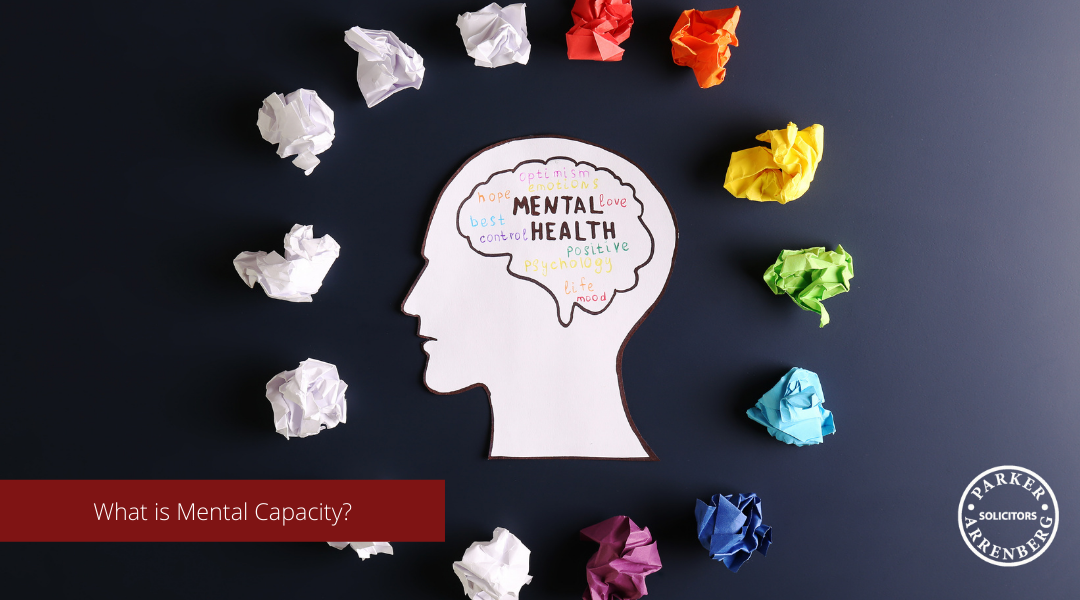Mental capacity in legal terms is your ability to:
- make your own decisions,
- to have sufficient understanding to comprehend the situation, and;
- the consequences of any actions or decisions at the time a decision needs to be made.
What can cause a lack of mental capacity?
A lack of capacity can occur for a number of reasons, including:
- A learning disability
- Mental health illnesses
- Brain injury
- Dementia
- Alcohol or drug use
- Side effects of medical treatment or a serious illness or disability
- Any other mental impairment or disability
However, even if someone has one of these health conditions, it does not always mean they lack the mental capacity to make a specific decision for themselves. For example, a person with a learning disability may lack the mental ability to make significant decisions, but this does not necessarily mean they cannot make other decisions for themselves, such as what they will wear or eat each day.
A person with a mental health problem may be unable to make decisions when unwell but can make them when they are well.
Other degenerative illnesses such as dementia are likely to affect someone’s ability to make decisions for themselves as if dementia progresses and gets more severe.
If you lose mental capacity, the Mental Capacity Act 2005 (MCA) protects you and your rights.
Why is the mental capacity act important?
The Mental Capacity Act (MCA) is important as it helps make sure that people who may lack the capacity to make decisions on their own, get the support they need to make those decisions.
MCA is designed to protect and empower people who may lack the mental capacity to make their own decisions about their care and treatment. It applies to people aged 16 and over.
How can you assess if someone has mental capacity?
Someone is said to be lacking in mental capacity if they are unable to do one or more of the following four things:
- Understand the information that is relevant to the decision they want to make
- Retain the information long enough to be able to make the decision
- Weigh up the information available to make an informed decision
- Communicate their decision by any possible means
What laws govern mental capacity?
The Mental Capacity Act 2005 provides a statutory framework to protect vulnerable people who may not be able to make their own decisions.
It provides safeguards to ensure the decisions made on behalf of a person are made in their best interests such as under Lasting power of attorney. Where a decision has to be made for a person who lacks capacity and is made correctly and following the requirements, that person making the decision is protected from legal action sought against them.
What are the key principles of the Mental Capacity Act?
The key principles that must be followed by anyone who is considering making a decision for someone else under the mental capacity act are as follows:
- Someone is presumed to have capacity unless it is proved otherwise
- Individuals must be supported to make their own decisions, for example with the help of counselling or medication, and be given all appropriate information before it is decided they do not have capacity
- People have a right to make decisions others may see as eccentric or unwise, provided they have the capacity to make the decision
- Anything done for someone without capacity must be in their best interests
- Anything done for someone without capacity must be the least restrictive of their basic rights and freedoms.
The principles under 4 and 5 only apply when a person has been assessed not to have the NECESSARY mental capacity in relation to the decision in question. Whilst it is not a principle of the Act, it is vital to remember that mental capacity is time and decision specific.
They must also follow the Mental Capacity Act Code of Practice, and only make decisions that are in the best interests of the person concerned. Furthermore, before someone can make decisions on behalf of an incapacitated individual, they should undertake a comprehensive mental capacity assessment.
Court of Protection and Mental Capacity Law
The Court of Protection is responsible for assisting people that no longer have the mental capacity to make decisions. They are responsible for:
- deciding whether someone has the mental capacity to make a particular decision for themselves
- appointing deputies to make ongoing decisions for people who lack mental capacity
- giving people permission to make one-off decisions on behalf of someone else who lacks mental capacity
- handling urgent or emergency applications where a decision must be made on behalf of someone else without delay
- making decisions about a lasting power of attorney or enduring power of attorney and considering any objections to their registration
- considering applications to make statutory wills or gifts
- making decisions about when someone can be deprived of their liberty under the Mental Capacity Act
Putting in place safeguards for the future
Did you know that without specific legal documents in place, your spouse, loved one, or next of kin will not have the automatic right to make decisions on your behalf if you lose the ability or capacity to make them for yourself? Most people realise that they should have a Will to deal with their affairs after they have died. However, many do not consider how family members can protect their best interests whilst they are still alive. It may seem daunting to talk about what should happen if you or a loved one loses mental capacity in the future, but making these decisions now will save further distress and complications if that were to happen. There are various things that you can do in preparation, including considering the following documents:
- Lasting Power of Attorney – A power of attorney allows you to give someone you trust the legal power to act on your behalf if in the future you lose the ability to make decisions for yourself. The person making the power of attorney is called a donor and the person appointed to act on their behalf is called an attorney. You can read more about these in our previous blogs by clicking on the links below:
– Lasting Power of Attorney for Health and Welfare
– Lasting Power of Attorney for Property and Finances
- Make an advance statement – This is a formal declaration of your general preferences about your treatment and care. They can only be made by someone who has mental capacity at the same time. Advance statements are not legally binding, but medical professionals should still make a practical effort to follow your wishes.
- Make an advance decision – Unlike an advance statement, this document is legally binding. It gives you the legal right to refuse specific medical treatment in the future, at a time when you may not have the mental capacity to make the decision for yourself. An advanced decision cannot be used for anything else.
Mental Capacity and Court of Protection Solicitors
Before putting in place any legal document, it is advisable to seek the appropriate legal advice to avoid any possible problems or disputes in the future. At Parker Arrenberg, our specialist private client solicitors have the knowledge and expertise to provide expert guidance on all areas of Mental Capacity, Court of Protection and Lasting Powers of Attorney.
We are here to help you and your family through difficult times. Get in touch with our team today to discuss how you can plan for the future to protect your best interest if the worse were to happen. Call 020 3911 2084, email reception@parkerarrenberg.co.uk or make an online enquiry.


